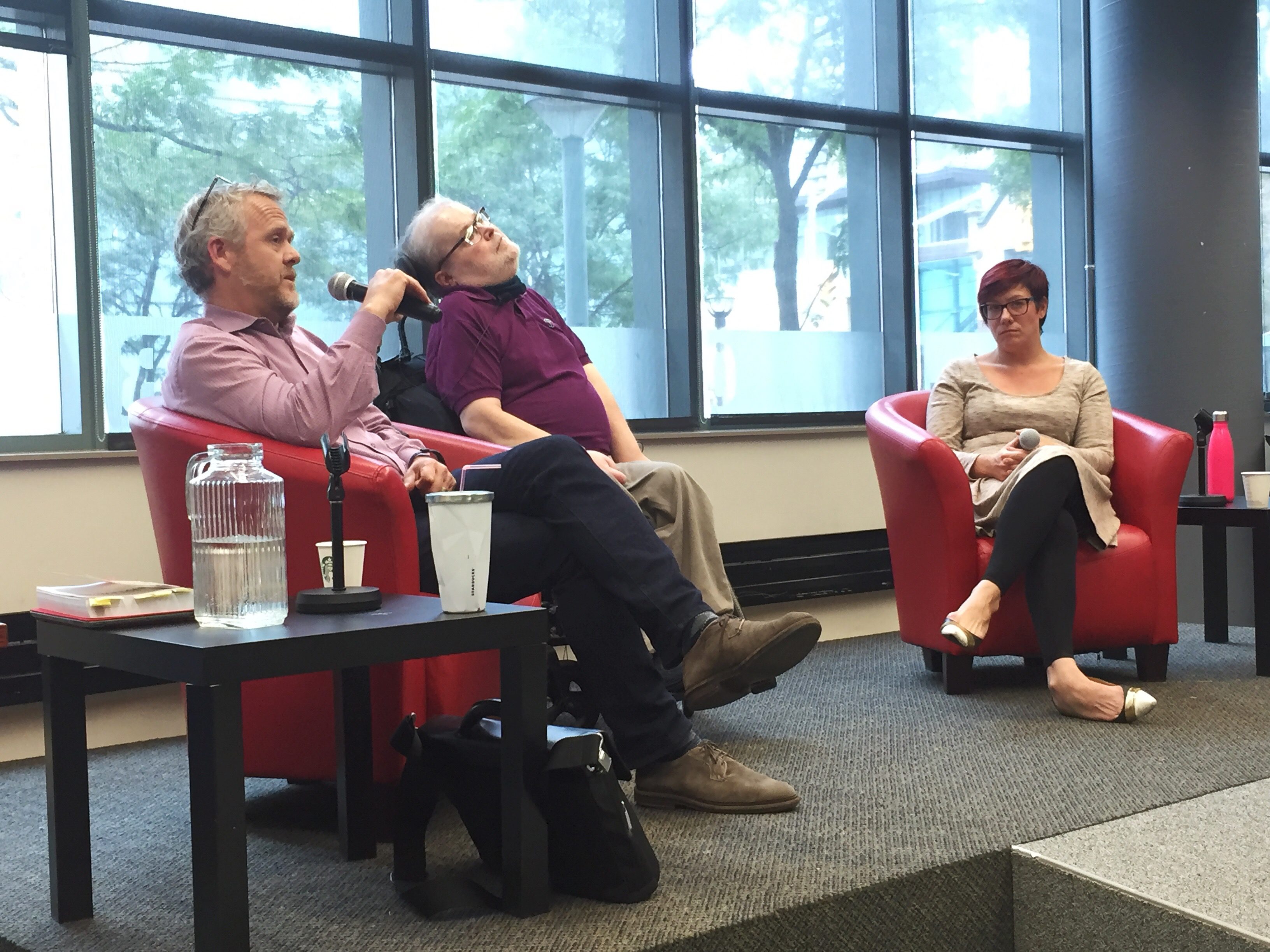By ALLISON RIDGWAY and ANIA BESSONOV
Staff Reporters

The Canadian Press (CP) is discussing how to update its stylebook to reflect changing language surrounding LGBTQ, Indigenous and disabled communities, CP’s editor-in-chief said during a Ryerson Journalism Research Centre panel earlier this month.
But the national news agency must keep its clients and readers in mind when contemplating such changes, said editor-in-chief Stephen Meurice.
“Clarity of language is key,” Meurice told about 90 journalism students and members of the public at the panel. “You want people to read your whole story and you want them to understand what’s going on … We do have to think about the small clients who are in areas that might be more conservative.”
Panel members discussed current language issues in news writing and reporting, including the singular use of “they” as a gender-neutral pronoun. Along with Meurice, the panel featured former Toronto Life editor and Ryerson School of Journalism instructor Stephen Trumper and Andrea Houston, a freelance journalist who teaches a course at the school on queer media. A video-slideshow prepared by journalism professor Joyce Smith discussed language issues that arise in the coverage of religion and security.
The CP wire service is purchased by news organization across the country, with clients that range from large metropolitan daily newspapers to smaller rural publications. It is also the publisher and editor of the Canadian Press Stylebook, a guide to journalistic conventions in Canada that is used by many news outlets and taught to journalism students.
A new edition of the style guide is expected next year, and Meurice said decisions will need to be made about what to say in the book on issues such as gender-neutral pronouns or the word “cisgender” (a term that describes people who are not transgender). While the stylebook does include an entry on the term “transgender,” it does not include an entry on the use of the singular “they.”
The singular use of “they” as a gender-neutral, third person pronoun is often used as a more inclusive pronoun, as it avoids assigning a gender to a person who does not identify as exclusively a woman or a man. Some people choose other gender-neutral pronouns, such as “xe” and “ze,” but the singular use of “they” is often the most popular.
Houston said that it is the responsibility of journalists to represent their sources respectfully.
“When you are interviewing a source and they ask for a gender-neutral pronoun, obviously don’t challenge them on this,” she said. “It’s not up to you, as a journalist, to have this debate – to debate someone’s identity. It’s up to you to respect them and represent them with compassion and honesty, as they want to be represented.”
Meurice, who said CP may well incorporate the use of “they” as standard practice in the styleguide, said the wire service does take the wishes of sources into account: “We would never intentionally use the pronoun ‘he’ or ‘she’ if someone had specifically asked us not to,” he said of CP’s policy.
Journalists, however, do not always receive support from their editors on these issues, Houston warned.
“I have had situations where I have been overruled by an editor when a gender neutral pronoun was put into a story, and that’s really unfortunate when that happens.”
Reader confusion can be avoided, Houston said, if news organizations include a brief explanation of why the singular “they” was used in a text.
“Words change and language changes and it’s fantastic to educate [readers],” she added.
The panelists also discussed language sensitivities and judgment calls related to covering religion and disability.
Trumper, who is on the board of the Canadian Abilities Foundation, said that perception surrounding disability is just as important – if not more so – as the language used to describe people with disabilities.
“We are the country of Terry Fox and Rick Hansen. We tend to revere the very athletic types of people with disabilities…but that’s not a true representation of all people with disabilities because not everyone has that strong upper-body strength or strong willpower,” he said. “In reality, [people with disabilities] are just ordinary people who can sometimes do extraordinary things.”
Joyce Smith, an associate professor at the School of Journalism who teaches reporting on religion, spoke on the importance of language as it relates to religion – particularly language surrounding Muslim communities.
Words like “radical,” “moderate,” “conservative” and “liberal” often come up when reporting on terrorist attacks, she said, but can demonize and stereotype religious people – particularly Muslims.
“It’s very important to think about how these words are coming to be suggested,” said Smith. “Is it the group themselves [using these words]? Is it their opponents? Is it a critic?”
A terrorist attack may be partially motivated by religious ideology, she explained, but many cases have other contributing factors as well. After Michael Zehaf-Bibeau shot a Canadian soldier to death at Parliament Hill in 2014, many news agencies were quick to jump on the fact that he attended mosques, identified as Muslim, and had expressed support for jihadists in the past. Later, however, it was revealed that Zehaf-Bibeau had also been mentally ill and struggled with a drug addiction, factors that his mother said led to the shooting.
“It’s really important when we’re using religious words to remember that it’s not the only way to characterize someone’s motivation or their actions,” Smith said. “Separate the action from the ideology and the motivation.”
